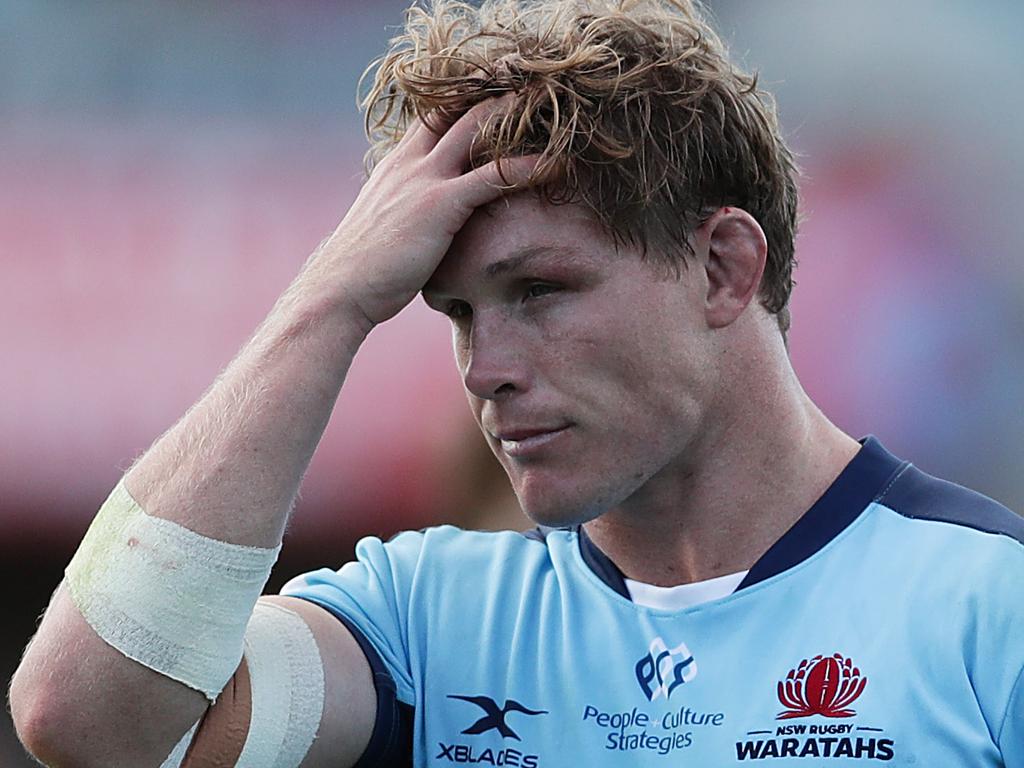Rugby’s reset could spell end to Michael Hooper’s Wallabies reign

This always had shaped as the year for reimagining possibilities, what with the volatile, five-year reign of Michael Cheika coming to an end and so many Wallabies bringing down the curtain on their international careers following a disappointing World Cup.
But this time, it is way more than that. An era has come to an end in Australian rugby. When the game does resume, there will be little about it that reeks of the familiar. There will be a new Wallabies coach in residence, Dave Rennie, choosing his players from a leaner, lighter Super Rugby-style competition.
The money, too, will be reset. Rugby wages are coming down the world over but even if it is only here, it may be that Australia can afford to pay top dollar for half-a-dozen players at best, with the rest of the side filled in as best we can.
Will this be the moment to abandon the Giteau Law, one wonders, or to enforce it all the more fiercely?
Wallabies captain Michael Hooper had hoped to use this season for a personal reset, which was entirely understandable. His two stints as Australian captain have been spread over six seasons, though in reality he was skipper for 13 Tests in 2014 once Stephen Moore broke his ankle and only returned to the job three years later after Moore had relinquished the captaincy but still continued in the Test side. And all that while Hooper had captained the Waratahs.
So it was a brave call on his part to step back from the NSW captaincy this season and concentrate just on his own game. Cheika never saw any reason to look beyond him as captain but Rennie is a total unknown, one who — in his brief visit to Australia in January — made no players any promises, least of all Hooper.
Hooper was 22 when Ewen McKenzie made him captain of the Wallabies for the first time — the youngest leader since Ken Catchpole — and even now is only 28, time enough to forge a new partnership with the team’s Kiwi coach. Still, with so many other momentous changes happening in Australian rugby, is he still the leader to take the Wallabies forward?
The stats don’t make a compelling case for his retention. The Wallabies won only 19 Tests out of 46 under him, a depressing 44.56 per cent. Significantly, in the two years when Moore returned to the captaincy role, in 2015-16, the Wallabies jumped to a 56 per cent win rate, winning The Rugby Championship and reaching the World Cup final in 2015.
Rennie will have noted, too, that the Waratahs’ spell over the Wallabies has been well and truly broken. For a time there, playing for the Waratahs was like playing for NSW in cricket, an easy entree into the Test side. But the Australian World Cup side of 2023 looks like being a far cry from the blue-tinged World Cup teams of 2015 and, to a lesser degree, 2019.
It is the Brumbies and Rebels and Reds who look like supplying most of the next World Cup squad, and if Rennie is looking to make a change at the top, he could well look to one of their leaders.
The Brumbies are captained from the unlikely position of tighthead where Allan Alaalatoa rules as the best No 3 in the country. It’s unusual for a prop, who puts his head in all those dark places, to have the vision to be a skipper but then Moore himself was a hooker. Importantly, too, his teammates play for him. It was only when Brumbies coach Dan McKellar pointed that out to him that Alaalatoa agreed to lead the side.
By contrast, the Rebels are led from fullback, which seemingly is too far removed from the action. If South African-born Dane Haylett-Petty was made Wallabies skipper, he would be the first No 15 to captain Australia in 40 years, since Paul McLean, now the Rugby Australia chairman, led the team against Fiji. Still, as McLean noted, what better position to view the entire game?
And then there is Queensland captain Liam Wright, another product of the republic and just 22 years old. Still, that gives him time to grow into the role and it would have to be said that the Wallabies of 2023 look like having a distinctly maroon hue.
It could be argued that opting for Wright at openside flanker would be a continuation of the battle Hooper and David Pocock waged throughout their careers. Still, Alaalatoa is under selection pressure from Taniela Tupou of the Reds while Haylett-Petty is far from a certainty at fullback, given the form of the Brumbies’ Tom Banks.
An uncomplicated man is Dave Rennie. It will be fascinating to watch how he wrestles with this problem.





It is society’s latest buzzword — “reset”. And when society finally does come through the COVID-19 crisis and Australian rugby faces up to the challenge of resetting itself in a brave new world, will it do so with a brave new Wallabies captain at the helm?